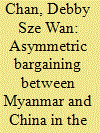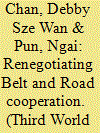| Srl | Item |
| 1 |
ID:
153720


|
|
|
|
|
| Summary/Abstract |
The Myitsone Dam suspension is an asymmetric negotiation between Naypyitaw and Beijing. The bilateral agreement of the hydropower project was concluded in 2009. However, Myanmar's civil society started to oppose the dam when political opportunities expanded in 2011. The quasi-civilian government in Myanmar was caught in an ‘audience cost dilemma': either to disappoint domestic constituents by fulfilling international obligations, or to compensate the Chinese dam developer for breaching the contract. In September 2011, Myanmar President Thein Sein declared the suspension of the dam throughout his tenure. Unexpectedly, China's state-owned dam company did not sue Naypyidaw. Moreover, Beijing even engaged with societal actors in Myanmar to seek their support for the project. How could Naypyitaw defy Beijing in this Myitsone Dam case? Drawing from 35 interviews with anti-dam campaigners and other stakeholders, as well as secondary data, this article argues that the rise of civil society successfully conditioned Naypyitaw's diplomatic options in the controversy. The change of Beijing's diplomatic strategy confirms that domestic constraint in Myanmar is not rhetorical. The Myitsone Dam case is an example that shows bilateral agreement without domestic endorsement can become China's business risk. Presumably, the dispute has wider implications for other Chinese overseas projects outside Myanmar.
|
|
|
|
|
|
|
|
|
|
|
|
|
|
|
|
| 2 |
ID:
175529


|
|
|
|
|
| Summary/Abstract |
In what way can societal actors in transitional polities play a role in influencing bilateral economic agreements? Societal actors are often ignored in the state-centric international relations literature. We, however, contend that social resistance to a foreign development project can reshape the international outcome, even under an asymmetric bargaining structure, if two conditions are met: the host country’s policy options are conditioned by citizens’ resistance; and the home country is eager to continue cooperation. To make this argument, this paper examines the social resistance to the China-backed Letpadaung copper mine in Myanmar amid the host country’s democratisation. Employing a process-tracing technique and drawing upon extensive interviews from 2015–2019, official documents and secondary data, we argue that a popular anti-mining movement transformed a previous state-to-state bargaining process into a two-level game negotiation. As a result, the rise of societal actors was able to disrupt project implementation and extract concessions from China in exchange for project resumption.
|
|
|
|
|
|
|
|
|
|
|
|
|
|
|
|